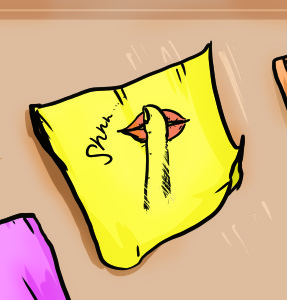In the first floor of Arrillaga Dining Commons is a large TV monitor mounted on the wall adjacent to a large window overlooking the kitchen. The monitor displays an image of a large corkboard with colorful post-it notes. Each note contains a short message, revealing a secret sent anonymously by text message. The messages vary wildly in tone from “I’m overworked” to “I wish I had used a condom” to “I’m so happy for my beautiful friends!!!!!!” to “Sometimes it’s hard to pretend that I’m happy all the time.”

The live post-it board screen in Arrillaga is the site of PostStanford, a project launched last Thursday by the ASSU Health and Wellness Executive Team with the aim of improving communication between students on campus. Spearheaded by former ASSU Chair of Health and Wellness Stephanie Liou ’13, PostStanford was inspired by PostSecret, a website to which users can anonymously mail in their secrets on homemade postcards. PostStanford operates on a similar principle by creating an open but safe space where students can free themselves from the emotional burden of their secrets.
“It’s really mentally healthy for people to express a secret,” said ASSU Chair of Health and Wellness Taylor Winfield ’13. “Carrying baggage inside really just weighs you down and a lot of times, people have something that they’re afraid of what people will think if they find out — they’re afraid of being embarrassed.”
ASSU Chief Technology Officer Michael Fischer, a doctoral student in computer science, set up a program through which students can interact with the live screen by texting messages to 414-11. Once the messages pass through a spam filter, they appear as a note on the screen for all to see. The secrets displayed are diverse both in topic and degree of positivity. Secrets have been posted on relationships, stress, classes and sexuality. While the degree of pessimism that colors some of the notes may startle some students, the creators said they believe student mental health is a conversation that must be brought to the forefront.
“People are always talking about Stanford Duck Syndrome,” Winfield said. “We’ve been talking about it for so long…humans have a negativity bias where they always notice what’s bad.”
Winfield emphasized that PostStanford promotes open sharing of emotions.
“If something great happens to you, share it,” Winfield said. “If you’re having a rough day, share it. If something funny happens, share it. Share your feelings, whether [they’re] good or bad.”
“We don’t want this to be a pity board,” she added. “We hope that this program will help people who have secrets realize that they can share them in a safe environment, and then if they do need it, they can get more help.”
According to Winfield, the initial response has been overwhelmingly positive. On the day of its launch, the board received around 50 text messages. Talks of expanding the board to other dining halls, however, will be dependent on continuing level of student interest.
“Post a secret — post something, say something,” Winfield said. “Someone else can read it and know that they’re not alone in the struggle.”
– Jenny Thai